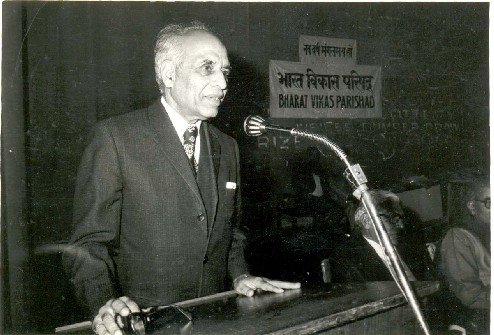Words shall fail you, if you try and reduce men of peaking stature into a few hundred words.
However, words can certainly seed emotions revering such a breed of men. It was on this day, 25th of February, that a gladiator fell prey to death. Justice H.R.Khanna surpassed the highest levels of moral integrity both on and off the bench. Looking at the development of our democracy in retrospect, Justice Khanna has shaped, saved and sifted much to where it really stands today. Being the sentinel of justice in the Supreme Court, he authored the doctrine of basic structure, which in itself has stood guard to the spirit of the constitution. It may be said that the doctrine of basic structure is similar to the walls of troy that can disembowel any attempt to undermine the what they protect. It is also pertinent to point out that each such attempt leads to the evolution of the aforesaid doctrine covering all chasms left at the time of its birth, such is the brainchild of Justice Khanna.
It is the crucial times that put a man’s mettle to test. Owing it to such circumstances that the best of us come to fore. In April 1976, a bench of five odd judges presided over a case popularly known as the Habeas Corpus case. The government of that time under Mrs. Indira Gandhi’s reign developed a metastasis of sycophancy which was noxious for a democracy to function. Such was its might that it managed to find acolytes in an independent judiciary as well. The question of law was whether life and liberty could be redressed in courts while the state was under threat. It was H.R.Khanna, J who stood up against the hubris of a despotic executive in defence of not only the rights of a few individuals but also the upheld the principle of Rule of law which binds our constitution. However, Ultimate beauty lies in the fact that he delivered a dissenting opinion being fully aware that he would loose the much coveted office of the Chief Justice of India. In his autobiography he recalls his last day describing a gloom that had creeped into corridors of the supreme court. It was the last day as a judge, it was not a garment that could be cast off but it was like skin being torn with ones own hands. He recalls how the members of the staff stood in corridor and greeted with folded hands. They did not say anything but their looks were more eloquent than any words. From the turn of events can it be said that his eve was in truth was his dawn?
Justice Khanna’s conquests when it comes to morality and righteousness set too high a bar for an ordinary human being. The reason for such posthumous flattery is that the anecdotes never end. A couple of years after he resigned, he was offered position to head a commission of inquiry to look into the affairs of Maruti Company which had been set afloat by Sanjay Gandhi. However, Khanna, J refused stating that the episode of his supercession would play spoilsport as a bias could be apprehended by the general public. Even though he was confident about conducting an honest enquiry, he said “Justice must not only be done, but it should also seem to be done” and curtly refused. The love for his country and how it kept him in the swing of things can be seen as he went straight to Morarji Desai, the then Prime Minister, when the parliament expelled Mrs.Indira Gandhi from the house for misconduct. He expressed his indignation for he believed that such arbitrary action would portend ill for the future of democracy in India, as it would set a bad precedent. He requested the Prime Minister to withdraw the order of expulsion immediately. However, desai remarked about Mrs.Gandhi’s uncouth behaviour and stated that she deserved it. His legal argument being that expulsion was supported by majority of the house. To this, Khanna,J stated that government in power is usually in majority and that it would set a bad precedent if the parliament was to expel any member of the opposition whom it found to be troublesome. It is this disinterested manner in which he takes a bird’s eye view that has made him the greatest Judge of all time. Only Justice Hans Raj Khanna has had the honour of having his portrait in a Supreme Court room, no other judge has ever been bestowed with this honour. He has the inner satisfaction of feeling that he has lived above the fog in public duty and in private thinking. His real monuments are his rulings and his judgements. To the stature of such a judge, the Chief Justiceship of India could have added nothing.
Life is neither roses nor thorns, he says, it is a mixed fare. It has its high points of achievements and depressing phases of failure. We have to take life as it is- a continuous activity and struggle, with its sun-shines and shadows, its comic aspects and tragic episodes. He states that humans by and large are basically good. There are some who belong to the highest species of nobility but who otherwise live in obscurity. We as citizens must take inspiration and idolize such heights of personal and moral growth that he achieved. A vote of thanks, on occasion of his death anniversary becomes necessary, for his contribution to the cause of preserving the democratic spirit and standing guard to the constitution.
Submitted By: Sushant Kareer


